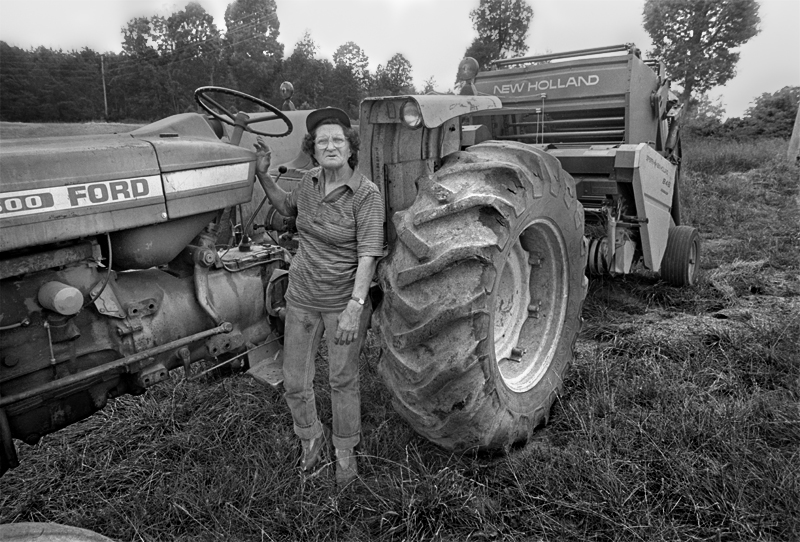I met Edna Harris in 1986. I was freelancing for the Rural Advancement Fund (RAF,) a 50 year old non-profit, farm advocacy organization and traveling with Charlie Thompson. Charlie was a field organizer for RAF who was working with small farmers throughout the southeast that were suffering through a long-term drought with thousands facing foreclosure. He was given the task of introducing me to specific farmers that I would photograph to illustrate stories, appeal letters, and brochures. Edna Harris was one of those farmers.
Within a couple of months, I was hired to a staff position and one of my jobs was to continue and broaden the documentation I had begun as a freelancer. Over the next couple of years, I spent many days and nights with Edna, her husband Lonnie, and their extended family. I took my young son with me a couple of times to hang out with Edna’s two grandsons of the same age. Edna’s was a comfortable place where you were encouraged to feel at home and be yourself.
Edna and Lonnie farmed their entire lives on 160 acres in Iredell County, in the small hamlet of Harmony. They raised tobacco and owned a small dairy, grew gardens, kept chickens and hogs and lived their lives within their small community. They had three sons, 19 grandchildren, and too-many-to-count greats and great-greats. Theirs was a full life. They were not rich by any means, or even middle class, but there was always plenty to eat and enough money to pay the mortgage on the farm and their short-term agricultural loans.
By the mid-1980s things had changed. Lonnie had suffered a stroke and was unable to do much of the work around the farm, which fell to Edna to do. The boys had left home by then, married, worked on off-farm jobs, and had little time to help out. Then came the drought, which crippled the two Carolinas for a number of years. Hay, corn, tobacco, even row crops were stunted and non-productive. The cows gave less milk. Edna and Lonnie, like many of their neighbors, were unable to pay bills and were quickly facing foreclosure. Keeping the land in the family was of primary importance to Edna and Lonnie. They understood the farm served as both legacy and insurance. It offered survival.
Edna, desperate, called a hotline for distressed farmers that had been set up by RAF and soon learned she was not the only farmer facing financial disaster. This was a period of time when the number of farm foreclosures nationwide exceeded the number during the 1930s. With guidance from RAF, Edna was able to wrestle with her problems and get back on track with her loans. She also came to understand she had a gift for working with other farmers in similar circumstances. People trusted Edna and would be open with her. She began running her own hotline and founded a local chapter of the United Farmers Organization. She worked with Willie Nelson’s Farm Aid and was awarded the Nancy Susan Reynolds Award by the Z. Smith Reynolds Foundation in 1987.
I got to know Edna pretty well. Words that come immediately to mind are tough, resilient, down to earth, open, and generous. She was a fair person, able to see both sides of an issue, while being clear about what the outcome should be. She had opinions, generally in favor of the little guy, and I would say she never knew a stranger.
Edna died in March 2012. The farm had been paid off in full a few years earlier and she was buried close by. At the Visitation, as she lay in her casket, I focused my eyes on her hands – smooth, un-calloused, and spotlessly clean – so unlike the hands I remember when I was most around her. Back then, her hands were rough, arthritic, and permanently clenched, with dirt etched deeply into her skin. Dirt that she wore with pride - a symbol of the working person she knew herself to be.





